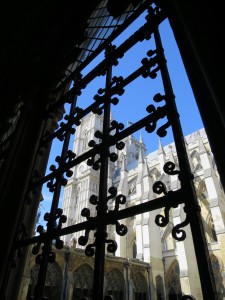 These days, I don’t spend much time frequenting the massive European churches like I once did as a teenager. Here in London, I only visited Saint Paul’s Cathedral and Westminster Abbey because I had free passes and friends visiting from out of town. If it were not for them, I don’t know if I would have ever ducked into either place on my own.
These days, I don’t spend much time frequenting the massive European churches like I once did as a teenager. Here in London, I only visited Saint Paul’s Cathedral and Westminster Abbey because I had free passes and friends visiting from out of town. If it were not for them, I don’t know if I would have ever ducked into either place on my own.
While visiting last week, I found an impressive amount of gilded purpose within each church. There’s the deliberate capture of the sun’s eastern rise so it shines through stained glass and into Saint Paul’s nave. The perpendicular gothic of Westminster’s Lady Chapel was constructed in a way that demands respect for its enduring intricacy. All of these highlights are undoubtedly a feast for the eyes— but to be honest they were not the highlights that left my feelings stirred. That distinction, as it turned out, came at other points along my tour.
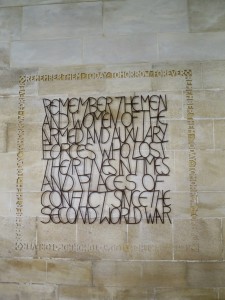 In the apse of Saint Paul’s Cathedral, once you get beyond the ridiculous baldacchino, there is an American chapel, complete with secular-looking stars laid into the marble floor. Just before these stars, and sitting at the midpoint of the chapel semicircle, there’s a Roll of Honor laying open under glass protection. Within the massive book one can find the names of 28,000 Americans killed enroute to or while stationed in the United Kingdom from 1941-1945. Casualties of World War II. Their names take up prime real estate in one of London’s most sacred spaces.
In the apse of Saint Paul’s Cathedral, once you get beyond the ridiculous baldacchino, there is an American chapel, complete with secular-looking stars laid into the marble floor. Just before these stars, and sitting at the midpoint of the chapel semicircle, there’s a Roll of Honor laying open under glass protection. Within the massive book one can find the names of 28,000 Americans killed enroute to or while stationed in the United Kingdom from 1941-1945. Casualties of World War II. Their names take up prime real estate in one of London’s most sacred spaces.
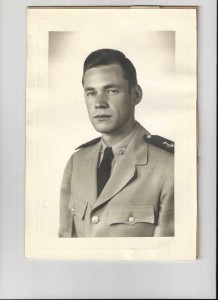 Like many Americans, my grandfather was a veteran of World War II. He is now 96 years old. I thought about him as I scanned the register of names who never lived to see their grandkids do the type of things that I was now doing.
Like many Americans, my grandfather was a veteran of World War II. He is now 96 years old. I thought about him as I scanned the register of names who never lived to see their grandkids do the type of things that I was now doing.
Just below the main floor of Saint Paul’s, there is also a crypt containing the remains of Horatio Nelson. Of course, every self-respecting naval officer knows at least a little bit about Lord Nelson, and I am no exception. His black sarcophagus is at the center of the crypt, and to my American eyes it was reminiscent of the resting place of our own naval hero, John Paul Jones. That marble sarcophagus lies in a similar crypt just across the Atlantic Ocean in Annapolis Maryland.
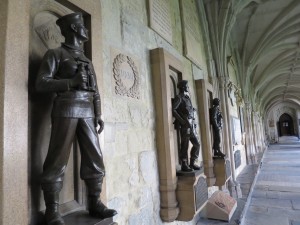 My grandfather, like Nelson and Jones, is also a Navy man. Although he never mentioned it to me while growing up, he was the skipper of a submarine chaser that fought in the Pacific Ocean. Like other people who lived to see the end of a major conflict, he completed his service and then got on with his life back in his home country.
My grandfather, like Nelson and Jones, is also a Navy man. Although he never mentioned it to me while growing up, he was the skipper of a submarine chaser that fought in the Pacific Ocean. Like other people who lived to see the end of a major conflict, he completed his service and then got on with his life back in his home country.
During my visit to both Saint Paul’s and then Westminster Abbey, I found powerful tributes that existed outside the bounds of religion. The sacrifices of various men and women were recorded everywhere— an attempt to honor common people who most likely would have come back home and gotten on with their lives had fate given them a different path.
“Gallipoli 1915: To salute the heroism and fortitude displayed and to remember those who did not return.”
“Pilot Officer Fiske, Royal Air Force: An American citizen who died that England might live.”
“Remember the Polish Airmen who reached the shores of Britain in the perilous years of 1939-40 to fight valiantly in defense of our island.”
“Remember with pride and gratitude all those who fell in the service of the crown.”
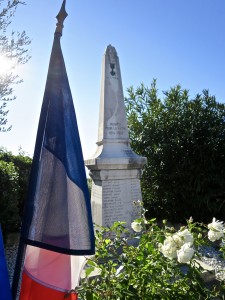 As I walked around and read these words, I thought about how I had no clue who these people were in terms of flesh and bone human beings. Indeed the entire planet is dotted with similar remembrances, and it demonstrates how we continually strive to remain above the waterline of existence, long after we die. Ultimately though, we all leave this earth and are replaced— and maybe remembered for a time before our faces ultimately blend back into the greater collective. Later generations will “remember”, but they won’t really remember us.
As I walked around and read these words, I thought about how I had no clue who these people were in terms of flesh and bone human beings. Indeed the entire planet is dotted with similar remembrances, and it demonstrates how we continually strive to remain above the waterline of existence, long after we die. Ultimately though, we all leave this earth and are replaced— and maybe remembered for a time before our faces ultimately blend back into the greater collective. Later generations will “remember”, but they won’t really remember us.
Up in Maine, my grandfather has just entered a veteran’s hospital and is no longer the man any of us knew. Apart from occupying a body that is simply wearing itself out, he suffers from dementia and is no longer in the business of recognizing the world he helped to create. He’s taken to singing the national anthem in his hospital bed (yes, we’re allowed to find this funny) and it is just a matter of time before I’ll get a phone call giving me the final word on his condition. He’s 96, and I can be glad to have had him for so long, but this still doesn’t make any of it easy.
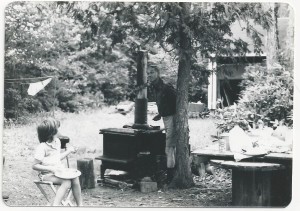 As important as it is to remember, sometimes remembering can be a hard thing to do. It’s especially hard when you’re standing at the crossroads of change, and you know that sometime very soon, all that you’ll be left with are fragments of memory. It’s what makes you feel sorrow, and it’s also what makes you want to go out and commission your own remembrance forged in metal that will hopefully stand the test of time. To at least let others down the road know that way back when— long before their time— there were people who gave a damn and allowed you to enjoy your life as it is.
As important as it is to remember, sometimes remembering can be a hard thing to do. It’s especially hard when you’re standing at the crossroads of change, and you know that sometime very soon, all that you’ll be left with are fragments of memory. It’s what makes you feel sorrow, and it’s also what makes you want to go out and commission your own remembrance forged in metal that will hopefully stand the test of time. To at least let others down the road know that way back when— long before their time— there were people who gave a damn and allowed you to enjoy your life as it is.
I’ll never know the personal details of the names inscribed on those church plaques, monuments and headstones. But it’s okay. At least for this moment, I get that it doesn’t really matter. Through my grandfather’s life work, and the contributions of everyone who came before him, I feel an unfathomable amount of gratitude for every moment that they were here with us.